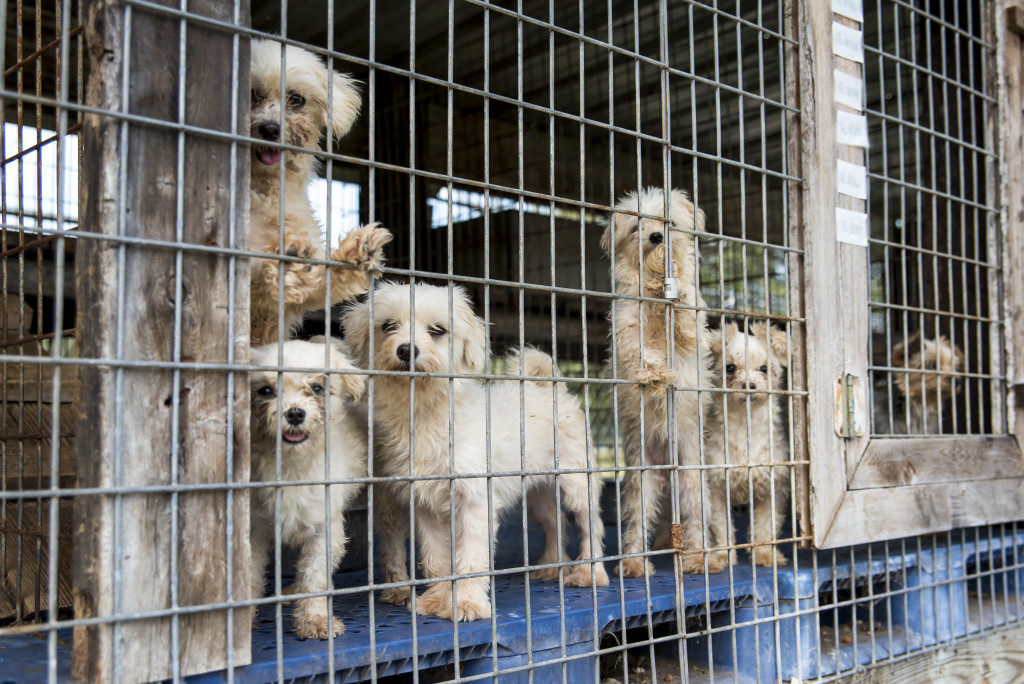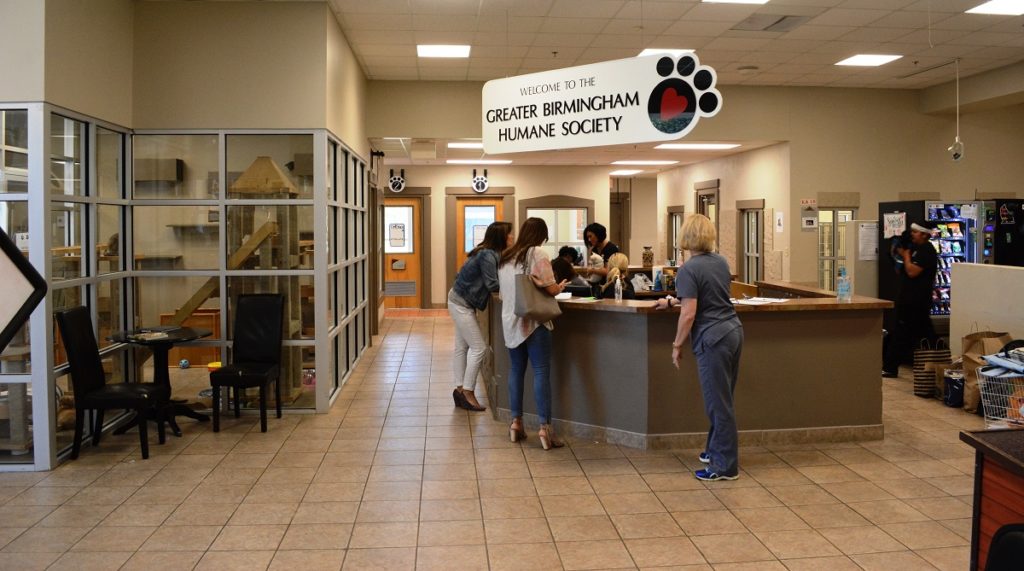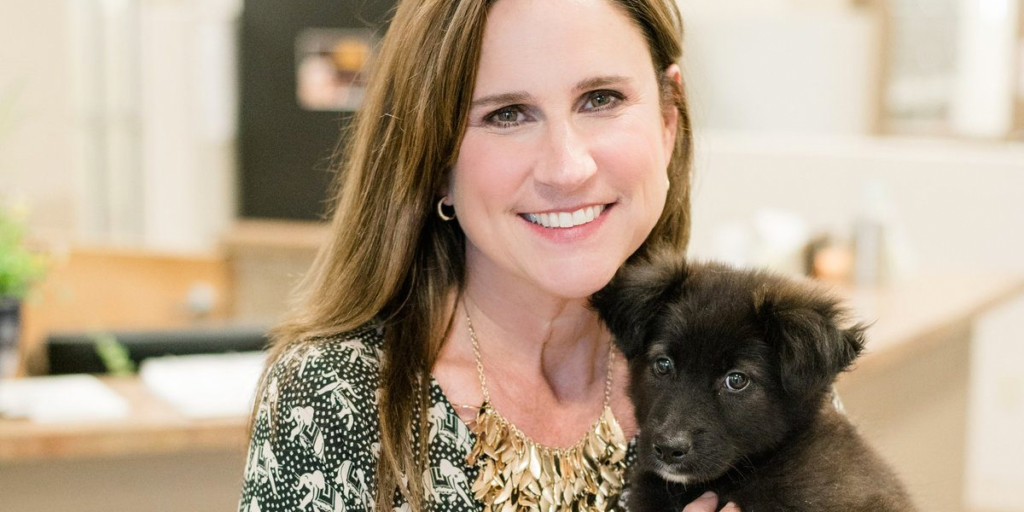Update on puppy mill rescues by Greater Birmingham Humane Society and how you can help

Last month, the Greater Birmingham Humane Society took in a whopping 83 puppies and dogs from a suspected puppy mill in Trussville, Ala. That same week, in a less reported bust a boxer puppy mill breeder relinquished 18 additional dogs to the GBHS. The Trussville bust included over a dozen pregnant dogs so the 83 number is climbing has climbed those dogs have given birth. Since the dogs were rescued, 24 additional puppies have been born. “Many of the animals, some of which are in the late stages of pregnancy, were crammed two to three in a wire cage. Dogs were together in stacked inadequate, wire-bottom cages and crates caked in excrement and filth. Most of the dogs are suffering from abscessed teeth and gum infections, along with other illnesses,” GBHS shared in statement about the Trussville rescue. Sadly, it’s not all good news. One of the dogs taken in passed away. Likely due to the extreme conditions they endured at the suspected puppy mill. The story was covered nationally including in a feature by People which quoted Courtney Underwood the Director of Marketing and Outreach at GBHS saying, “I’m no longer going to mourn the life that they have missed, I’m going to be proud to be a part of what’s next.” Here’s a look at what’s happening with the dogs from the Trussville puppy mill: Total taken in on day police contacted GBHS: 83 Total born since original intake in shelter: 24 (22 up until Friday of last week and two last night Tue. Aug. 14, 2018.) Total died in shelter/care: 1 Any euthanized and reason: 1 Behavior (Aggressive/Dangerous/ Evaluated – Bites, Animal Aggressive, Food Aggressive) Number of animals made available to public for adoption: 30 ( +1 who went to Transport) Number of new fosters that came in when this story ran: more than 100 individuals applied to be a foster home. Number of animals currently in foster: 72 (including all of the new puppies who have been born since their mothers were placed into foster). Legislation to stop puppy mills Now, that the GBHS has it hands full will an overflow of pups and it’s motivated more than ever to support the passing of a bill to protect against puppy mills. First introduced in 2017, the Alabama puppy mill bill, better known as “Atti’s Bill,” or HB45 and SB17 in their respective chambers, requires commercial breeders of dogs and cats to be licensed and inspected annually in hopes to put an end to inhumane practices like puppy mills. While neither bill directly refers to “puppy mills” they would apply to cat and dog breeders who have more than 10 female animals. They’d have to be licensed and inspected by the Alabama Dog and Cat Breeders Commission, which the legislation also creates. The state Department of Agriculture and Industries would have jurisdiction over the commission and funding would be covered through breeders’ licensing fees. To find more information on this piece of legislation and how you can stop puppy mills like the one featured here: visit the Alabama Puppy Mill Project’s website. To give to a tax-deductible donation to help not just the puppy mill animals but also the regular intake and pet surrenders at the Greater Birmingham Humane Society visit their website here.
Greater Birmingham Humane Society calls for legislative action after ‘very sad week for animals’

The Greater Birmingham Humane Society (GBHS) is calling for legislative action against puppy mills in the state following a puppy mill bust in Trussville, Ala. The GBHS rescued 83 dogs from the property which was deemed unfit for all the animals this week; the property owners were selling parakeets as well. According to AL.com, the property owners voluntarily surrendered all the animals but might face criminal charges of animal cruelty and operating a business without a license. GBHS CEO Allison Black Cornelius took to Facebook, to plead with voters and local legislators to file legislation in the next session to protect animals within the state. “It has been a very sad week for animals in our community with the passing of a dog left in a car in extreme heat and a puppy mill bust,” the group posted on Facebook. “GBHS Chief Executive Officer, Allison Black Cornelius, urges citizens to remember these two cases when the next legislative session begins and offer your support to promote legislation that protects animals in our state.” The shelter is accepting donations of puppy pads, puppy food and adult dog food. Last year, Jacksonville-Republican state Rep. K.L. Brown and Bessemer-Democrat state Sen. Priscilla Dunn both introduced bills drafted by the Alabama Puppy Mill Project, HB45 and SB17, in their respective chambers, which require commercial breeders of dogs and cats to be licensed and inspected annually in hopes to put an end to inhumane practices like puppy mills. The bills did not pass in the session.
Greater Birmingham Humane Society under fire for high kill-rates

The Greater Birmingham Humane Society (GBHS), whose mission is to “promote respect for life through education and prevention of cruelty to animals and people,” has come under fire in the last year for what many deem “unnecessarily high” euthanasia rates. Proponents’ view The allegations originally came about in October of 2017, when a grassroots group, the No Kill Movement (NKM) posted a blog post featuring a Facebook video where GBHS CEO Allison Black Cornelius held a sign that read “120 in 6.5 hours,” dated June 27, 2017. In the video, Cornelius explains that the shelter had bested their previous record, taking in 120 animals in one day. She then implores video viewers to donate to the shelter, while panning a room full of kittens who had been surrendered earlier in the day. According to the NKM, after the filming of the video, a staff member referred to as “Ruth” was ordered to kill all of the kittens in the room. “All of them were healthy or treatable,” Ruth said. “And, there were foster homes available for them.” Stella Burton, who was the foster coordinator when this took place, and who was present during this exchange, corroborated Ruth’s story. Cornelius denied the allegations, saying “I never ever did anything of the sort. It’s not sort of untrue. It’s not ‘oh you misunderstood me’ or maybe they took something out of context. It never happened,” according to WBRC FOX 6 news. But NKM founder Mike Fry tells a different story, saying his organization “has received numerous complaints from former GBHS staff members and volunteers. “I’ve been doing this work for about 20 years and I’ve never experienced anything like this,” Fry told WBRC. GBHS Chairman Art Edge ultimately admitted that the kittens were killed, but denied the order came from Cornelius. But regardless of who ordered the kittens killed, the shelter’s euthanasia numbers remain the same. The GBHS is required by law to issue monthly reports on the number of animals taken in, treated and euthanized in the shelter. In the May 2017 report on the shelter’s website, the total number of animals taken in that month was 1,538, while the number of animals euthanized was 687. According to the report, 26 of those euthanasia’s were due to overcrowding, while 32 animals who were euthanized were considered treatable-rehabilitatable. The report also states that the euthanasia rate was 51 percent while the Live Release rate was 49 percent for that month. According to blogger Donald Watkins: From May 2017 through April 2018, GBHS killed 289 healthy animals solely because of “overcrowding”. These killings were administered at a time when GBHS had a long list of fully vetted, qualified, and publicly acknowledged “Shelter/Rescue Partners” that were capable and willing to house and care for these animals. When the number of animals killed in the “Treatable-Rehabilitatable” category (i.e., medically contagious, physical condition, unweaned, etc.) is added to this twelve-month total, the overall number of kills in two of the three “Unnecessary Euthanasia” categories skyrockets to a staggering 1,093 dogs, cats, and other animals. “Treatable-Manageable” is GBHS’s third category of “Unnecessary Euthanasia”. The total dogs, cats, and other animals killed in this category for the same twelve-month period is 108. GBHS admits to killing 6,621 dogs, cats, and other animals in the “Unhealthy-Untreatable” category during this twelve-month reporting period. “We realize this topic generates a great deal of passion and emotion,” GBHS told Alabama Today. “We simply ask that conversations to be productive not personal, feedback be based on facts, and an acknowledgement that the problem of pet overpopulation is not created by shelters. By working together to change policies relating to improving access to affordable spay/neuter, appropriate licensing of pets and breeders, and changing laws and perceptions of how our community handles feral and stray cats will we start to see change.” Animal Control When Cornelius took over the humane society in 2014, one major source of income she sought was a government contract to take over the animal control in unincorporated parts of Jefferson County. The GBHS won the contract, and has been taking care of Jefferson County, including Birmingham’s stray animal problems since. “They wanted to be animal control and they have continually misrepresented their outcome statistics, making people falsely believe it is safe to bring their pets there. Then, they complain when people bring their pets to them,” one local advocate told NKM. According to Watkins, the GBHS received $1,032,829 in FY17 “derived from animal control contracts with various local government agencies.” But GBHS disagrees, saying people the perceived high euthanasia rates are because people comparing shelters that serve very different animal populations “Bottom line: The majority of these people are comparing shelters that serve very different animal populations and their respective outcomes when measuring live release and euthanasia rates among shelters,” GBHS told Alabama Today. Rural shelters are different than urban shelters. Small city shelters do not face the same challenges as large city shelters. Dual shelters (shelters that take owner surrenders and run animal control and impoundment) are different than single-purpose shelters. Shelters run by a government entity are different than those run by for-profit contractors or 501c3 organizations. The GBHS is an open intake shelter. We provide animal control and impoundment for Jefferson County and several cities within it, and we also take in pets surrendered by their owners. We turn no animal away regardless of the pet’s age, appearance, health condition, behavior, or breed. GBHS’ live release and euthanasia rates cannot be accurately compared to qualified intake shelters. GBHS measures necessary euthanasia (euthanasia required due to behavior and untreatable conditions) and unnecessary euthanasia rates (euthanasia mostly due to lack of space). GBHS has a very low unnecessary euthanasia rate compared to other animal control providers in the nation. GBHS responds Alabama Today reached out to GBHS asking questions to get their side of the story, the following answers were received straight from the shelter: Is the organization taking any steps to change the rates? GBHS is one of the largest shelters in the nation and serves more than 20,000
Women of Influence: Greater Birmingham Humane Society CEO Allison Black Cornelius

There’s no shortage of influential women doing amazing things in the Yellowhammer State and Birmingham’s Allison Black Cornelius is certainly one of them. The President and Chief Executive Officer at the Greater Birmingham Humane Society (GBHS), Cornelius is also the Founder and President of Blackfish, a consulting group specializing in “total team strategy” using organizational, staff, and board development programs. Cornelius has faced more than her fair share of adversity but has used it to fuel her work, and advocacy for those who can’t speak for themselves. A graduate of John Carroll High School, she received her nonprofit, and leadership education through the Harvard Business School Social Enterprise Initiative where she completed her MBA. Cornelius is a true testament to the resilience of the human spirit. When she was seven years old, she was molested and raped several times by her Sunday School teacher, Leon Prince over the course of three months. “Leon Prince doesn’t just rape you, he tortures you,” Cornelius told WSFA. Prince told her if she refused to do what he asked, or told anyone what he was doing that he’d kill her dog, so Cornelius stayed silent for 20 years. In 1988 Cornelius began the long, and arduous task of facing Prince and informing the world of what he had done. Prince was indicted and sentenced to 30 years in prison, of which he only served 15 years. “We were lucky for him to do 15,” she says. “It brought me 15 years where he didn’t mess with a kid. Now, we’re back to square one,” she told AL.com. Cornelius played a huge role in the court process, and the process of others; spearheading the passage of Megan’s Law in 36 states and creating the first Sex Offender Registry in the nation, and has founded more than 50 child advocacy centers around the country as well as Court Appointed Special Advocate (CASA) agencies. But she’s done so much more than that. Cornelius has been hard at work lately between the humane society and Blackfish, making over 150 presentations each year. She offers lectures and trains audiences, nonprofit organizations, government agencies and Fortune 500 companies on how to just “keep on swimming.” She has trained more than 1,000 nonprofit boards and raised more than $30 million for charity through these public presentations. Cornelius has traveled the world speaking; the year before she became CEO of the Humane Society, she traveled 265 of 365 days in the year. She’s given messages at the Kennedy Center, for professional sports teams, celebrity foundations, and the White House. She’s won several awards including: Birmingham 12 SMARTEST Women 2012, Animal Advocate of the Year, Citizen of the Year, Woman of Distinction, Mervyn H. Sterne Award, and was an Olympic Torch Relay Runner. Cornelius accepted the CEO position at GBHS in 2014, and has brought the company to a $4.5 million annual budget, operating three facilities, providing jobs for 80 employees. The humane society currently takes in over 23,000 animals each year, and that number is only growing. When Cornelius took over the humane society in 2014, one major source of income she sought was a government contract to take over the animal control in unincorporated parts of Jefferson County. The GBHS won the contract, and has been taking care of Jefferson County, including Birmingham’s stray animal problems since. She is currently concentrating on revitalizing the GBHS; which include plans to build a news $30 million facility located on land nestled between Titusville and will house all of the GBHS’s programs and services and provide more room for additional students from both Auburn and Tuskegee University’s. The facility would also contain a Cat Cafe, a growing trend in the U.S. From her extraordinary career despite the horrendous acts committed against her, her ability to turn her pain into advocacy for other, and her service to animal lovers in Birmingham, it’s indisputable why Allison Black Cornelius is this week’s woman of influence.


